Westmont Magazine The Enduring Servant Leadership of David Winter
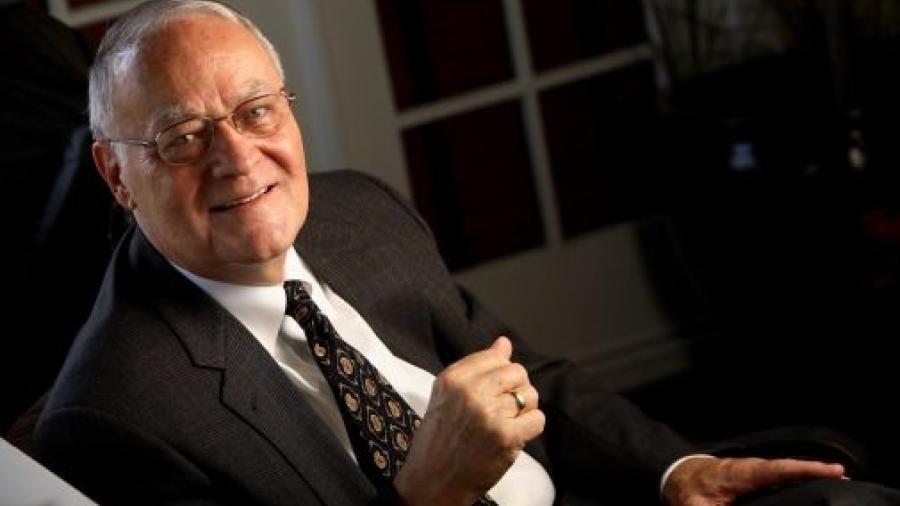
Although David K. Winter died in 2015, his legacy lives on at Westmont. He served as president for 25 years (1976-2001)—longer than any other president—and returned as interim president and chancellor in 2006-2007. Under his leadership, Westmont became a nationally ranked liberal arts college. He helped strengthen the quality of the faculty and students, facilities on campus, student life and outreach programs, the endowment, and off-campus study opportunities.
“Westmont continues to benefit from Dave’s contribution during his long and distinguished service,” says President Gayle D. Beebe. “The college and our local community are fundamentally different and better because of his vision and the work he accomplished. The Kingdom of God is also richer and better for the many ways Westmont graduates serve throughout the world.”
Winter articulated a compelling case for liberal arts education, which develops essential skills such as communication and critical thinking. He described it as the best possible preparation for leadership careers. A man of deep and sincere faith, he enhanced spiritual life programs and opportunities for student ministry. Actively involved in national higher education organizations and accrediting agencies, he championed faith-based institutions. He promoted student life programs and sought to create a strong campus community for students to help educate the whole person. In 1986, Bowling Green State University released a study of higher education officials and scholars that named Winter as one of the 100 most effective college leaders in the United States.
Winter served in the U.S. Navy for four years as an air intelligence officer and earned a bachelor’s and a master’s degree from UCLA and a doctorate in anthropology and sociology from Michigan State University (MSU). Under a Ford Foundation grant, he conducted anthropological field work in Lahore, Pakistan, for 18 months. He taught at Wheaton College in Illinois, Calvin College in Michigan, and earned tenure as a professor at MSU. In 1970, he became the academic vice president at Whitworth College in Spokane, Wash., rising to executive vice president in three years. In July 1976 he returned to his native Southern California to serve as president of Westmont, succeeding Lyle C. Hillegas (1972-75).
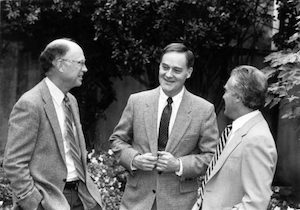 President Winter worked to strengthen relationships with the college’s neighbors. He went door to door to meet them and hear their concerns. After the devastating Sycamore Fire in 1977, he encouraged 500 students to volunteer to help local residents who lost their homes in the blaze. Winter continued reaching out to the neighborhood and the community throughout his long tenure. He led efforts to gain permission to average enrollment at 1,200 and to build 41 homes in Las Barrancas for faculty families. He also started the work of updating the college’s Approved Master Plan.
President Winter worked to strengthen relationships with the college’s neighbors. He went door to door to meet them and hear their concerns. After the devastating Sycamore Fire in 1977, he encouraged 500 students to volunteer to help local residents who lost their homes in the blaze. Winter continued reaching out to the neighborhood and the community throughout his long tenure. He led efforts to gain permission to average enrollment at 1,200 and to build 41 homes in Las Barrancas for faculty families. He also started the work of updating the college’s Approved Master Plan.
In 1998, Winter suddenly lost 80 percent of his eyesight due to restricted blood flow to the optic nerves. He quickly adapted to this condition and continued to lead the college, relying on his excellent memory when speaking and leading meetings. He retired in 2001 but returned for a year in 2006 while the college sought to replace Stan Gaede, Winter’s successor who had stepped down to resume the life of a scholar. Gayle D. Beebe became Westmont’s eighth president in July 2007.
After his second retirement, Winter served as headmaster of Providence, a college-preparatory Christian high school in Santa Barbara, from 2008-2011. Winter served on numerous boards, including Cottage Health System, the United Way Campaign, the Mosher Foundation, Santa Barbara Chamber of Commerce, Montecito Association, Montecito Rotary Club, Santa Barbara Industry Education Council, Cottage Hospital, Oaks Christian High School, Providence High School, Independent Colleges of Southern California, Christian College Coalition, Association of Independent California Colleges and Universities, Santa Barbara Rescue Mission, Braille Institute, Young Life, Recording for the Blind and Dyslexic, Habitat for Humanity, Senior Commission of the Western Association of Schools and Colleges and the
Council on Higher Education in Washington, D.C.
A longtime community volunteer, he received the Santa Barbara News-Press Lifetime Achievement Award in 1998. The Council on Alcoholism and Drug Abuse named him one of their Twelve Men of Distinction. In 1999, the John Templeton Foundation selected Winter as one of 50 college presidents who have exercised leadership in character development. In 2013, he earned the Foundation Fighting Blindness’ Visionary Award.
On May 5, 2011, President Gayle D. Beebe honored Winter with former president Stan Gaede at the dedication of David K. Winter Hall for Science and Mathematics. A bronze statue outside the building depicts Winter walking with wife, Helene. Each year, Westmont students receive
the David K. Winter Character Through Servant Leadership Award for exemplary leadership through service at the college and in the community. The building and award pay tribute
to Winter’s commitment to the liberal arts, his strong faith and his servant’s heart.
While his name appears on a building and an award, Winter’s true legacy lies in the lives of the people he touched, including generations of students, professors, staff members and trustees. They speak eloquently of his impact and continuing influence in the Westmont community.
Gratitude for His Listening Heart
by Tony Askew, Professor Emeritus of Art
I am filled with memories and admiration for Dr. David Winter. David was a keen listener, a hospitable adviser, and a president of Westmont who modeled servant leadership.
I will remember him mostly as a true friend. I first met David after we moved to Santa Barbara and we were both members of El Montecito Presbyterian Church. Our sons became best
friends. It was my good fortune in 1982 to be hired to teach art appreciation at Westmont, and becoming a member of the faculty was a dream and a blessing. I soon learned that as president, he was ever available to hear and listen to ideas and supportive of growth in the art department. In his vision for the college, he desired to expand all the arts and to truly define the liberal arts. He and his wife, Helene, greatly expanded the social presence of the college in Montecito
and Santa Barbara. His gracious warmth and active local involvement promoted the college with dignity and acclaim.
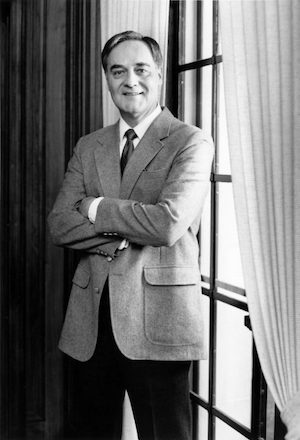 As the art department and gallery program grew, David and Helene were active supporters of art exhibits, were involved with Art Council activities, and were part of the leadership for four or more art trips. On these journeys, David talked about the college and the experiences of the
As the art department and gallery program grew, David and Helene were active supporters of art exhibits, were involved with Art Council activities, and were part of the leadership for four or more art trips. On these journeys, David talked about the college and the experiences of the
day and shared his vision and insight.
In 2001, we ventured to Italy with the President’s Trip. By this time, David had already lost his sight. We called the trip “Seeing with New Eyes.” I remember an early morning private tour of the Sistine Chapel and the Vatican Museum. That evening, David carefully summarized our visit with glowing perspective and sightless vision of Michelangelo’s art that none of us will ever forget. Reflection, speculative thinking and refreshment brought by his open ended vision.
“Vision is not just sight,” he said. “I have never seen so clearly.”
I will continue to think of David Winter with gratitude for his listening heart, his courage, kindness and consistent servant leadership. Our lives are forever touched by his love
of God and love of people.
He Served with Deep Christian faith
By Ed Birch, Westmont Trustee and Former Westmont Vice President
Every once in a while someone enters your life who makes a significant difference in what you think about, what you appreciate and what values you hold. David Winter was that
person for me.
The David Winter I knew touched so many lives and so many of our revered institutions. The quiet, humble, respectful and gracious, gentle man inspired us all. With the love of his life, Helene, by his side, he led, he cared, and he served with deep Christian faith and love of humankind. When blindness struck him suddenly in 1998, he spoke of it as his new adventure, of the things he could still do, that while he lost his sight he could now see more clearly than ever before. He commented to a local newspaper interviewer, “I have no pain. I sleep well. I have a good life.”
The David I knew led by example; he walked the talk. We watched him. We listened to him. We learned from him. He modeled a life filled with strong values, affirmation and constant encouragement of others, graciousness and humbleness—a life God expects of each one of us.
The David I knew built Westmont into one of the country’s leading institutions of higher education and he brought the college into the mainstream of our community to be embraced and appreciated by all.
I can never forget my dear friend David. He was my guiding light. He was my friend, and he was my colleague. He gave me new perspectives on life. He gave me deeper understandings of my faith and acting on my faith. His affirming, gracious and supportive spirit will be with me
and guide me always. That is the David I knew. And I’m guessing that is the David we all knew.
A Low-Key, Tenaciously Principled Style
by Merlin Call, Trustee Emeritus
Modest, gracious, principled, collegial and thoughtful are only a few of the words that come to mind as we contemplate the loss of David Winter. He was modest about what he did and did not know, but decisive and gracious in designing habits and attitudes to attract the effective counsel of others. His style was low-key but tenaciously principled. He was diligent in responding faithfully, without flamboyance, to responsibilities and opportunities. Even blindness he accepted as merely another context within which to learn and grow personally and continue his service to others.
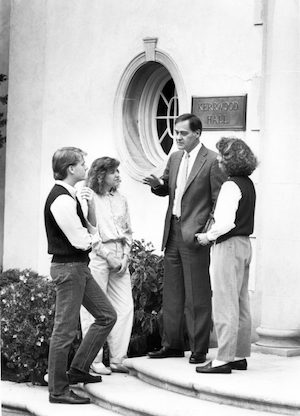 His kind and decent nature combined with a thoughtfulness that made him a readily accepted leader at Westmont, in the community and in the broader reaches of higher education. His contributions were sought by many, including the Western Association of Schools and Colleges,
His kind and decent nature combined with a thoughtfulness that made him a readily accepted leader at Westmont, in the community and in the broader reaches of higher education. His contributions were sought by many, including the Western Association of Schools and Colleges,
the Association of Independent California Colleges and Universities, the National Association of Independent Colleges and Universities, and the Council for Christian Colleges and Universities. But his motivating focus was always the student, evidenced in many ways but most notoriously by his open-door policy as Westmont’s president.
As one who knew David for more than 70 years, I am convinced that he would divide his life into BH and AH: Before Helene and After Helene. His devoted wife, companion and counselor provided the love that cared for him far beyond his physical needs, and the spark that rejuvenated him in the middle of his presidency to complete his stabilizing and formative impact on the college. Our debt of gratitude extends to both of them.
A Productive President and Beloved Leader
by Stan Gaede, Alumnus, Former Westmont President and Former Westmont Provost
David Winter was an amazing human being. A good friend, whether we were working across the same hallway or living on opposite coasts. He was also as productive as anyone I have ever met. For that reason, it’s easy to get lost in the legacy of David Winter. He accomplished so much throughout his long and illustrious career that the sheer volume of his contribution is difficult to comprehend (much less reduce to mere words).
In the 25 years he led Westmont as president, the college not only became a nationally ranked liberal arts college, but a leader in Christian higher education. While other colleges grew in size, Westmont grew in stature. While many schools abandoned their heritage, Westmont deepened its roots and bore the fruit of its Christian convictions. While some universities gobbled up (or ignored) their neighbors, Westmont built bridges to the local community, which facilitated increased understanding and mutual appreciation for years to come.
None of this was easy, of course. And the sacrifice of time and effort that both Dave and Helene invested on behalf of the college was immense. But many, many lives were impacted, including my own. Indeed, it is unlikely we would have returned to Westmont in 1996 without Dave’s intervention and persistence. But thankfully we came. And in the process, Dave not only taught me about leadership but grew me as a person. And today, all of us who journeyed with him are
deeply, deeply grateful.
Of course, like the rest of us, David made some mistakes. But unlike most of us, he didn’t hide his errors, he learned from them. Grew because of them. And in the end, his reach—as a respected and beloved leader—expanded far beyond Westmont and Santa Barbara. Indeed, today it reaches all the way to heaven.
An Inspiration to All Who Knew Him
by Gary Harris, Trustee Emeritus
I first met David when I joined the Westmont Board of Trustees in 1980. As president of the college, Dave showed exemplary leadership attributes in interacting with the board and his staff. He had a clear vision for the college and was able to articulate the value of a liberal arts education better than anyone I have heard.
Over the years, he and Helene developed a wonderful relationship with the Santa Barbara community. They established new traditions that provided a warm welcome to folks coming to campus. The Christmas reception and other events were created under Dave’s presidency.
Even though there were difficulties at times with neighbors over growth issues and faculty housing, Dave always maintained a measured, gentle spirit and approach in dealing with the
situations. He was always respected, and Westmont continued to achieve greater stature as a college under his leadership. Students were of utmost importance to the Winters. Dave gave inspiring chapel talks, had an open-door policy to his office, and the Winters invited students to their home frequently.
Dave and Helene developed a warm personal relationship with the board of trustees and their spouses. Besides my relationship as a trustee, I was privileged to have a wonderful personal friendship with Dave. We were in a church home group for many years and in a weekly men’s discussion group. Dave always brought a wisdom and perspective to any subject whether it was regarding faith, education or world events. He was so knowledgeable and wise.
Having been so closely involved with Dave, I saw a man of integrity and faith. When he lost his eyesight and even at the end when he was struck by cancer, he was able to trust the Lord through it. He not only had courage to face hardship, but was an inspiration to all who knew him. He was truly gifted with speaking and writing skills. He could articulate any subject and make it thoughtful and stimulating. Dave’s impact on Westmont, Providence Hall, the Santa
Barbara community and my life has been enormously positive.
A Living Textbook on Leadership
by Phyllis Marble, Trustee Emerita
David Winter was a walking textbook on leadership. He was ever the shepherding teacher. In my early days on his board of trustees, I just assumed you did your reading, brought your best thinking, met with colleagues, took a vote on whatever issue you faced, and the majority ruled. David taught us all that the collaborative approach, taking into account each and every voice around the table in equal measure until the deliberation reached consensus, was the wisest course. I quickly learned that this took time and patience. He had patience; I had to learn it.
He taught us about the various constituencies that make up a place such as Westmont: students, parents, faculty, administrators, staff, donors and neighbors. Each was critical
to the college, and each had differing needs, thoughts and points of view to offer. David had the weighty task of articulating the vision, shaping the goal or need clearly without tailoring or weakening his message (vision) to suit any part of the constituency at the expense of another. He kept the balance so skillfully, valuing each voice and ever pushing for the next level of excellence for the college. No one can make everyone completely happy all the time, but
David surely tried. He once said that college presidents usually are not overly popular people but that they had the task of articulating the vision for those who would see.
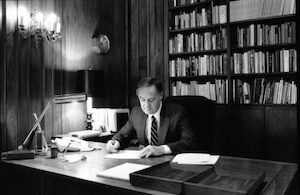 Maybe that is why his loss of eyesight in 1998 hit us so hard. He never complained. He must have grieved, but he did so in private. He had pain, regret, sadness and deep disappointment in his life, but he spoke of it to very few. And in that, he was always the teacher. He showed us how
Maybe that is why his loss of eyesight in 1998 hit us so hard. He never complained. He must have grieved, but he did so in private. He had pain, regret, sadness and deep disappointment in his life, but he spoke of it to very few. And in that, he was always the teacher. He showed us how
to articulate love for a spouse. He loved Helene deeply and said so often. He desired the best for his children and stepchildren. He left an example to follow.
We know David as a man of faith, in fact, a giant of the faith, but he would say, I think, that he was just a man following a great God. Even in the last days of his life, he was peaceful, could laugh and see humor and the good. His vision of his future was very clear.
Vision Is More than Sight
by Susan Savage, Professor Emerita of Art
As I reflect on David Winter’s many authentic attributes, I think first of his quiet humility and genuine caring nature. I recall a most memorable connection I had with him in 1999, about a year after he lost most of his eyesight. I will never forget the chapel talk he gave to the Westmont community soon after that loss. We were devastated for him, but in striving to help us comprehend his loss, he did a most characteristic thing: he helped us to see his situation much differently. David shared his understanding that God would use his affliction to show “the Lord’s goodness.” He told us that he had chosen to live his life with the new understanding
that “vision is more than sight.” He shared how the words of Psalm 121 sharpened his spiritual and emotional perspectives. “My vision has never been better,” he said. His words remain
with me to this day.
Soon after that chapel presentation David was invited to participate in a celebrity fundraiser for Hospice of Santa Barbara. Chosen for his contribution to the community as a “celebrity” educator and consummate humanitarian, he was given a prefabricated ceramic mask to embellish for auction. Unable to visually do the work himself, but not wanting to disappoint anyone by declining the invitation, he called on me and asked if I would “be his eyes” and create
something that he could contribute to this benevolent event. What a pleasure it was for me to work with him as I took the challenge to interpret what his “new vision” meant to him, and could mean to others, through the guise of this object. What a blessing it was for me to catch a firsthand glimpse of David’s true humility and see God’s grace and promises fulfilled through the life of this extraordinary man.